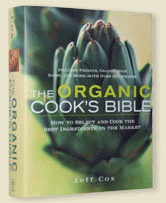Organic Plus!
Organic Lifestyle Comments Off on Organic Plus!
 I’m gratified to see more and more food products certified as organic, but now I’m seeing other labels attached to them, too. I’m thinking about terms like “air-chilled chicken,” and “grass-fed beef,” and “pastured cows” for milk production, and “wildcrafted,” and so on.
I’m gratified to see more and more food products certified as organic, but now I’m seeing other labels attached to them, too. I’m thinking about terms like “air-chilled chicken,” and “grass-fed beef,” and “pastured cows” for milk production, and “wildcrafted,” and so on.
What are these terms? Are they valid? Even moreso, are they valuable? The answer is yes, they are valid and valuable, but only if they are appended to foods labeled organic. Otherwise, they may represent an improvement over conventional food that doesn’t carry one of these terms, but the food may still be raised conventionally. And that means farming methods that cause environmental damage to the land and water, that disrupt healthy ecosystems, and that produce commodity-scale foods using toxic chemicals, routine antibiotics, artificial hormones, and disease-causing husbandry.
Let’s look at the terms one by one.
“Air-Chilled Chicken.” When the birds are slaughtered, their carcasses need to be cooled quickly, before microbes can proliferate. It’s typically done by plunging them into cold water. If a bird is infected, its pathogens will spread to other carcasses dipped in that water. Air chilling prevents the spread of germs by cooling the carcasses with blasts of cold air. It’s a good thing, but no protection from birds fed GMO feed and shot with antibiotics if they’re raised conventionally. For full protection, the air-chilled birds have to be organic.
“Grass-Fed Beef.” Feeding cattle grass encourages healthy bacteria in their multi-chambered digestive systems. Feeding them grains like corn and soybeans encourages the growth of pathogenic organisms. When cattle are grass fed, their meat is leaner and more nutritious. When they are also organically raised, that’s beef about as good as it gets.
“Pastured Cows.” This is grass feeding applied to dairy cows. Their milk contains more healthful essential fatty acids than grain-fed cows. They also aren’t confined to a barnyard that concentrates manure and can contaminate both cows and milk, requiring antibiotics to be used routinely. Pastured cows spend their days in pasture. When milk is organic, the cows also have not been fed GMO feed.
“Wild–Crafted.” This means the food is sourced from the wild. Thus it can’t be organic. The absence of agricultural chemicals doesn’t qualify a food as organic. Organic is a whole set of things to do as well as to avoid. Wild-crafted organic” food is a contradiction in terms.
***
The folks at Food Democracy Now are pressing for an organic farm bill. Here’s their proposal:
In order to meet the serious challenges of the 21st century, U.S. agricultural policy in the farm bill must shift from its focus of creating cheap commodities and artificially propping up income for farmers, toward implementing best agricultural practices for sustainable and organic production methods. Find out more at these sites:
http://action.fooddemocracynow.org/go/540?akid=477.101853.QyWsnk&t=10
http://action.fooddemocracynow.org/go/539?akid=477.101853.QyWsnk&t=13
Right now the perennial debate in Washington DC about food and agriculture policy is once again picking up with the renewal of the Farm Bill. Politicians are listening to lobbyists more than ever. Last year you helped shut down the undemocratic Secret Farm Bill with more than 100,000 phone calls from Food Democracy Now! members across the country. But that’s not good enough. We have a larger mission. It’s time to change the debate in Washington. Click here to say I want an Organic Farm Bill! We’ll deliver your message to Congress, the USDA and the White House that it’s time to make organic food and sustainable farming a priority.
***
U.S. Leaves Wine Out of Organic Deal with EU
The U.S. and EU concluded a major deal on organic food labeling last week, basically agreeing to recognize each other’s certification processes. In other words, if canned peaches are certified organic in Spain, they may be labeled as organic in the US. The only product left out of the agreement was wine, and once again sulfites were the culprit. The EU allows sulfites in organic wine. The US does not. Sulfites are crucial for wine production; wine is not likely to have fresh fruit flavors and aromas without them.
Many of the EU’s member countries simply know more about wine than the U.S. The U.S. National Organics Standards Board considered a petition to allow sulfites in organic wine last year, and a steering committee voted 5-0 to approve it, but the full board voted against it.
***
Derek Singleton, a distribution analyst at Software Advice, sent us the following note about food distribution in this country:
The U.S. has traditionally relied on a centralized approach to food distribution, which is part of the reason that the average food item travels roughly 5,000 miles before it reaches our plates. There are indications, however, that the centralized approach to food distribution may give way to a more local and regional approach to distribution.
Singleton recently looked at three trends he believes are pushing the industry toward a regional approach: a renewed interest in living in urban centers, increasing demand for fresh organically grown food, and rising gas prices will all contribute to a restructuring of the food distribution industry. Under this restructuring there will be much more attention focused on serving local regions. You can read his full post at The Future of U.S. Food Distribution.
***
The simplest way to avoid genetically engineered foods is to buy whole, certified organic foods, says Dr. Joseph Mercola in a recent blog. By definition, foods that are certified organic must never intentionally contain or use genetically engineered organisms, must be produced without artificial pesticides and fertilizers, and come from an animal reared without the routine use of antibiotics, growth promoters, or other drugs.
Additionally, grass-fed beef will not have been fed genetically engineered corn, although now that genetically engineered alfalfa has been approved, grass-fed will not always mean they animals have not consumed genetically engineered feeds. Unless the grass fed animals are organic.
Read Dr. Mercola’s important information on GMOs and how some journalists think that the move to label GMO foods as such is a terrible idea by visiting this website:
http://articles.mercola.com/sites/articles/archive/2012/02/29/gmo-food-labeling.aspx?e_cid=20120224_FNL_artTest_A1












